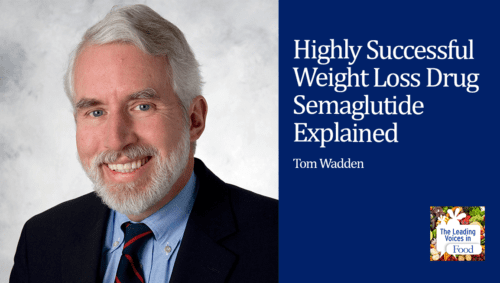The Leading Voices in Food
E259: Your state of the science on weight loss drugs
About two years ago, we released a podcast with Dr. Thomas Wadden of the University of Pennsylvania describing work on a new generation of medications to treat diabetes and obesity. They were really taking the field by storm. Since then, much more is known since many additional studies have been published and so many people have been using the drugs. So many, in fact, the market value of the Danish company, Novo Nordisk, one of the two major companies selling the drugs, has gone up. It is now greater than the entire budget of the country of Denmark. This single company is responsible for about half of Denmark’s economic expansion this year. So, a lot of people are now taking the drugs and this is a great time for an update on the drugs. And we’re fortunate to have two of the world’s leading experts join us: Dr. Wadden, Professor of Psychology and Psychiatry at the University of Pennsylvania School of Medicine and the inaugural Albert J. Stunkard Professor of Psychiatry at Penn. Joining us as well as Dr. Robert Kushner, a physician and professor of medicine at Northwestern University and a pioneer in testing treatments for obesity.
Subscribe: Apple Podcasts | TuneIN | YouTube Music | SoundCloud | PocketCasts | Radio Public
Tags: Diet & Nutrition | Food, Psychology & Neuroscience | Obesity | Weight Stigma |

Robert Kushner is Professor of Medicine and Medical Education at Northwestern University Feinberg School of Medicine, and Director of the Center for Lifestyle Medicine in Chicago, IL, USA. After finishing a residency in Internal Medicine at Northwestern University, he went on to complete a post-graduate fellowship in Clinical Nutrition and earned a Master’s degree in Clinical Nutrition and Nutritional Biology from the University of Chicago. Dr. Kushner is past-President of The Obesity Society (TOS), the American Society for Parenteral and Enteral Nutrition (ASPEN), the American Board of Physician Nutrition Specialists (ABPNS), past-Chair of the American Board of Obesity Medicine (ABOM), and Co-Editor of Current Obesity Reports. He was awarded the ‘2016 Clinician-of-the-Year Award’ by The Obesity Society and John X. Thomas Best Teachers of Feinberg Award at Northwestern University Feinberg School of Medicine in 2017. Dr. Kushner has authored over 250 original articles, reviews, books and book chapters covering medical nutrition, medical nutrition education, and obesity, and is an internationally recognized expert on the care of patients who are overweight or obese. He is author/editor of multiple books including Dr. Kushner’s Personality Type Diet (St. Martin’s Griffin Press, 2003; iuniverse, 2008), Fitness Unleashed (Three Rivers Press, 2006), Counseling Overweight Adults: The Lifestyle Patterns Approach and Tool Kit (Academy of Nutrition and Dietetics, 2009) and editor of the American Medical Association’s (AMA) Assessment and Management of Adult Obesity: A Primer for Physicians (2003). Current books include Practical Manual of Clinical Obesity (Wiley-Blackwell, 2013), Treatment of the Obese Patient, 2nd Edition (Springer, 2014), Nutrition and Bariatric Surgery (CRC Press, 2015), Lifestyle Medicine: A Manual for Clinical Practice (Springer, 2016), and Obesity Medicine, Medical Clinics of North America (Elsevier, 2018). He is author of the upcoming book, Six Factors to Fit: Weight Loss that Works for You! (Academy of Nutrition and Dietetics, December, 2019).
Thomas A. Wadden is a clinical psychologist and educator who is known for his research on the treatment of obesity by methods that include lifestyle modification, pharmacotherapy, and bariatric surgery. He is the Albert J. Stunkard Professor of Psychology in Psychiatry at the Perelman School of Medicine at the University of Pennsylvania and former director of the university’s Center for Weight and Eating Disorders. He also is visiting professor of psychology at Haverford College. Wadden has published more than 550 peer-reviewed scientific papers and abstracts, as well as 7 edited books. Over the course of his career, he has served on expert panels for the National Institutes of Health, the Federal Trade Commission, the Department of Veterans Affairs, and the U.S. House of Representatives. His research has been recognized by awards from several organizations including the Association for the Advancement of Behavior Therapy and The Obesity Society. Wadden is a fellow of the Academy of Behavioral Medicine Research, the College of Physicians of Philadelphia, the Obesity Society, and Society of Behavioral Medicine. In 2015, the Obesity Society created the Thomas A. Wadden Award for Distinguished Mentorship, recognizing his education of scientists and practitioners in the field of obesity.
Interview Summary
Tom, you and I were colleagues at Penn decades ago. And I got frustrated the treatments for obesity didn’t work very well. People tended to regain the weight. And I turned my attention to prevention and policy. But you hung in there and I admired you for that patience and persistence. And Bob, the same for you. You worked on this tenacious problem for many years. But for both of you, your patience has been rewarded with what seems to me to be a seismic shift in the way obesity and diabetes can be treated. Tom, I’ll begin with you. Is this as big of a deal as it seems to me?
Well, I think it is as big of a deal as it seems to you. These medications have had a huge impact on improving the treatment of type 2 diabetes, but particularly the management of obesity. With older medications, patients lost about 7 percent of their starting weight. If you weighed 200 pounds, you’d lose about 15 pounds. That was also true of our best diet and exercise programs. You would lose about 7 percent on those programs with rigorous effort. But with the new medications, patients are now losing about 15 to 20 percent of their starting body weight at approximately one year. And that’s a 30-to-40-pound loss for a person who started at 200 pounds. And with these larger weight losses, we get larger improvements in health in terms of complications of obesity. So, to quote a good friend of mine, Bob Kushner, these medications have been a real game changer.
Thanks for putting that in perspective. I mean, we’re talking about not just little incremental changes in what treatments can produce, which is what we’ve seen for years. But just orders of magnitude of change, which is really nice to see. So, Bob what are these medications that we’re talking about? What are the names of the drugs and how do they work?
Well, Kelly, this transformation of obesity really came about by finding the target that is really highly effective for obesity. It’s called the gut brain axis. And when it comes to the gut it’s starting off with a naturally occurring gut hormone called GLP 1. I think everyone in the country’s heard of GLP 1. It’s released after we eat, and it helps the pancreas produce insulin, slows the stomach release of food, and reduces appetite. And that’s where the obesity story comes in. So pharmaceutical companies have taken this hormone and synthesized it, something similar to GLP 1. It mimics the action of GLP 1. So, you could actually take it and give it back and have it injected so it augments or highlights this hormonal effect. Now, that same process of mimicking a hormone is used for another gut hormone called GIP that also reduces appetite. These two hormones are the backbone of the currently available medication.
There’s two on the market. One is called Semaglutide. That’s a GLP 1 analog. Trade name is Wegovy. Now, it’s also marketed for diabetes. Tom talked about how it is used for diabetes and increases insulin. That trade name is Ozempic. That’s also familiar with everyone around the country. The other one that combined GLP 1 and GIP, these two gut hormones, so it’s a dual agonist, the trade name for obesity is called Zep Bound, and the same compound for diabetes is called Mounjaro. These are terms that are becoming familiar, I think, to everyone in the country.
Tom mentioned some about the, how much weight people lose on these drugs, but what sort of medical changes occur?
Just to reiterate what Tom said, I’ll say it in another way. For Semaglutide one third of individuals are losing 20 percent of their body weight in these trials. For Tirzepatide, it even outpaces that. And I got a third of individuals losing a quarter of their body weight. These are unheard of weight losses.
And with these weight losses and these independent effects from weight, what we’re seeing in the trials and in the clinic is that blood pressure goes down, blood sugar goes down, blood fats like triglyceride go down, inflammation in the body goes down, because we marked that with CRP, as well as improvement in quality of life, which we’ll probably get to.
But really interesting stuff is coming out over the past year or two or so, that it is improving the function of people living with congestive heart failure, a particular form called a preserved ejection fraction. We’re seeing improvements in sleep apnea. Think of all the people who are on these CPAP machines every night. We’re seeing significant improvements in the symptoms of sleep apnea and the apneic events. And lastly, a SELECT trial came out, that’s what it was called, came out last year. Which for the very first time, Kelly, found improvements in cardiovascular disease, like having a heart attack, stroke, or dying of cardiovascular disease in people living with obesity and already have cardiovascular disease. That’s called secondary prevention. That, Tom, is the game changer.
Bob, I’d like to go back to Tom in a minute but let me ask you one clarifying question about what you just said. That’s a remarkable array of biological medical benefits from these drugs. Just incredible. And the question is, are they all attributable to the weight loss or is there something else going on? Like if somebody lost equal amounts of weight by some other means, would these same changes be occurring?
Those studies are still going on. It’s very good. We’re thinking it’s a dual effect. It’s the profound amount of weight loss, as Tom said. Fifteen to 21 to even 25 percent of average body weight. That is driving a lot of the benefits. But there also appear to be additional effects or weight independent effects that are working outside of that weight. We’re seeing improvements in kidney function, improvement in heart disease, blood clotting, inflammation. And those are likely due to the gut hormone effect independent of the weight itself. That still needs to be sorted out. That’s called a mitigation analysis where we try to separate out the effects of these drugs. And that work is still underway.
Tom, one of the most vexing problems, over the decades that people have been working on treatments for obesity, has been long term results. And I’m curious about how long have people been followed on these drugs now? What are the results? And what was the picture before then? How do what we see now compared to what you saw before?
The study that Bob just mentioned, the SELECT trial followed people for four years on Semaglutide. And patients achieve their maximal weight loss at about one year and they lost 10 percent of their weight. And when they were followed up at four years still on treatment, they still maintained a 10 percent weight loss. That 10 percent is smaller than in most of the trials, where it was a 15 percent loss. But Dr. Tim Garvey showed that his patients in a smaller trial lost about 15 percent at one year and while still on medication kept off the full 15 percent.
I think part of the reason the weight loss in SELECT were smaller is because the study enrolled a lot of men. Men are losing less weight on this medication than women. But to your question about how these results compare to the results of earlier treatment, well with behavioral treatment, diet, and exercise back in the 70s beyond, people lost this 7 or 8 percent of weight. And then most people on average regain their weight over one to three years. And the same was true of medication. People often stopped these earlier medications after 6 to 12 months, in part because they’re frustrated the losses weren’t larger. Some people were also worried about the side effects. But the long and short is once you stop taking the medication, people would tend to regain their weight.
And some of this weight regain may be attributable to people returning to their prior eating and activity habits. But one of the things we’ve learned over the past 20 years is that part of the weight regain seems to be attributable to changes in the body’s metabolism. And you know that when you lose weight, you’re resting metabolic rate, which is the number of calories your body burns at rest to maintain basic bodily functions. Your resting metabolic rate decreases by 10 to 15 percent. But also, your energy expenditure, the calories you burn during exercise decreases. And that may decrease by as much as 20 to 30 percent. So, people are left having to really watch their calories very carefully because of their lower calorie requirements in order to keep off their lost body weight.
I think one thing these new drugs may do is to attenuate the drop both in resting metabolic rate and energy expenditure during physical activity. But the long and short of it is that if you stay on these new medications long term, you’ll keep off your body weight. And you’ll probably keep it off primarily because of improvements in your appetite, so you have less hunger. And as a result, you’re eating less food.
I’d like to come back to that in a minute. But let me ask a question. If a person loses weight, and then their body starts putting biological pressure on them to regain, how come? You know, it’s disadvantageous for their survival and their health to have the excess weight. Why would the body do that?
Well, our bodies evolved in an environment of food scarcity, and our physiology evolved to protect us against starvation. First, by allowing us to store body fat, a source of energy when food is not available. And second, the body’s capacity to lower its metabolism, or the rate at which calories are burned to maintain these basic functions like body temperature and heart rate. That provided protection against food scarcity.
But Kelly, you have described better than anybody else that these ancient genes that regulate energy expenditure and metabolism are now a terrible mismatch for an environment in which food is plentiful, high in calories, and available 24 by 7. The body evolved to protect us from starvation, but not from eating past our calorie needs. And so, it’s this mismatch between our evolution and our appetite and our body regulation in the current, what you have called toxic food environment, when you can eat just all the time.
I guess you could think about humans evolving over thousands of years and biology adapting to circumstances where food was uncertain and unpredictable. But this modern environment has happened really pretty rapidly and maybe evolution just hasn’t had a chance to catch up. We’re still existing with those ancient genes that are disadvantageous in this kind of environment.
Bob back to the drugs. What are the side effects of the drugs?
Kelly, they’re primarily gastrointestinal. These are symptoms like nausea, diarrhea, constipation, heartburn, and vomiting. Not great, but they’re generally considered mild to moderate, and temporary. And they primarily occur early during the first four to five months when the medications are slowly dose escalated. And we’ve learned, most importantly, how to mitigate or reduce those side effects to help people stay on the drug.
Examples would be your prescriber would slow the dose escalation. So. if you’re having some nausea at a particular dose, we wait another month or two. The other, very importantly, is we have found that diet significantly impacts these side effects. When we counsel patients on these medications, along with that comes recommendations for dietary changes, such as reducing fatty food and greasy food. Reducing the amount of food you’re consuming. Planning your meals in advance. Keeping well hydrated. And very importantly, do not go out for a celebration or go out to meals on the day that you inject or at least the first two days. Because you’re not going to tolerate the drug very well.
We use that therapeutically. So, if you want to get control on the weekends, you may want to take your injection on a Friday. However, if weekends are your time out with friends and you want to socialize, don’t take it on a Friday. Same thing comes with a personal trainer, by the way. If you’re going to have a personal trainer on a Monday where he’s going to overwork you, don’t take the injection the day before. You’ll likely be nauseated, you’re not eating, you’re not hydrating. So actually, there’s a lot that goes into not only when to take the dose and how to take the dose, but how to take it to the best ability to tolerate it.
Two questions based on what you said. One is you talked about these are possible side effects, but how common are they? I mean, how many people suffer from these?
Well, the trials show about 25 to 45 percent or so of individuals actually say they have these symptoms. And again, we ask them mild, moderate, severe. Most of them are mild to moderate. Some of them linger. However, they really do peak during the dose escalation. So, working with your prescriber during that period of time closely, keeping contact with them on how to reduce those side effects and how you’re doing out of medication is extremely important.
And the second thing I wanted to ask related to that is I’ve heard that there’s a rare but serious potential side effect around the issue of stomach paralysis. Can you tell us something about that?
I mentioned earlier, Kelly, that these medications slow gastric emptying. That’s pretty much in everybody. In some individuals who may be predisposed to this, they develop something called ileus, and that’s the medical term for gastric paralysis. And that can happen in individuals, let’s say who have a scleroderma, who have longstanding diabetes or other gastrointestinal problems where the stomach really stopped peristalsis. In other words, it’s moving. That’s typically presented by vomiting and really unable to move the food along. We really haven’t seen much of that. We looked at the safety data in a SELECT trial that Tom mentioned, which was 17,000 individuals, about 8,000 or so in each group. We really did not see a significant increase in the ileus or what you’re talking about in that patient population.
Okay, thanks. Tom had alluded to this before, Bob, but I wanted to ask you. How do you think about these medicines? If somebody takes them, and then they stop using the medicines and they gain the weight back. Is that a sign that the medicine works or doesn’t work? And is this the kind of a chronic use drug like you might take for blood pressure or cholesterol?
That’s a great way of setting up for that. And I like to frame it thinking of it as a chronic progressive disease, just like diabetes or hypertension. We know that when you have those conditions, asthma could be another one or inflammatory bowel disease, where you really take a medication long term to keep the disease or condition under control. And we are currently thinking of obesity as a chronic disease with dysfunctional appetite and fat that is deposited in other organs, causing medical problems and so on. If you think of it as a chronic disease, you would naturally start thinking of it, like others, that medication is used long term.
However, obesity appeared to be different. And working with patients, they still have this sense ‘that’s my fault, I know I can do it, I don’t want to be on medication for the rest of my life for this.’ So, we have our work cut out for us. One thing I can say from the trials, and Tom knows this because he was involved in them. If we suddenly stop the medication, that’s how these trials were definitely done, either blindly or not blindly, you suddenly stop the medication, most, if not all of the participants in these trials start to regain weight. However, in a clinical practice, that is not how we work. We don’t stop medication suddenly with patients. We go slowly. We down dose the medication. We may change to another medication. We may use intermittent therapy. So that is work that’s currently under development. We don’t know exactly how to counsel patients regarding long term use of the medications. I think we need to double down on lifestyle modification and counseling that I’m sure Tom is going to get into. This is really work ahead of us, how to maintain medication, who needs to be on it long term, and how do we actually manage patients.
Tom, you’re the leading expert in the world on lifestyle change in the context of obesity management. I mean, thinking about what people do with their diet, their physical activity, what kind of thinking they have related to the weight loss. And you talked about that just a moment ago. Why can’t one just count on the drugs to do their magic and not have to worry about these things?
Well, first, I think you can count on the drugs to do a large part of the magic. And you may be surprised to hear me say that. But with our former behavioral treatments of diet and exercise, we spent a lot of time trying to help people identify how many calories they were consuming. And they did that by recording their food intake either in paper and pencil or with an app. And the whole focus of treatment was trying to help people achieve a 500 calorie a day deficit. That took a lot of work. These medications, just by virtue of turning down your appetite and turning down your responsiveness to the food environment, take away the need for a lot of that work, which is a real blessing.
But the question that comes up is, okay, people are eating less food. But what are they eating? Do these medications help you eat a healthier diet with more fruits and vegetables, with lean protein? Do you migrate from a high fat, high sugar diet to a Mediterranean diet, or to a DASH like diet? And the answer is, we don’t know. But obviously you would like people to migrate to a diet that’s going to be healthier for you from a cardiovascular standpoint, from a cancer risk reduction standpoint.
One of the principal things that people need to do on these medications is to make sure they get plenty of protein. And so, guidance is that you should have about 1 gram of dietary protein for every kilogram of body weight. If you’re somebody who weighs 100 kilograms, you should get 100 grams of protein. And what you’re doing is giving people a lot of dietary protein to prevent the loss of bodily protein during rapid weight loss. You did a [00:20:00] lot of research with me back in the 80s on very low-calorie diets, and that was the underpinning of treatment. Give people a lot of dietary protein, prevent the loss of bodily protein.
The other side of the equation is just physical activity, and it’s a very good question about whether these medications and the weight loss they induce will help people be more physically active. I think that they will. Nonetheless for most people, you need to plan an activity schedule where you adopt new activities, whether it’s walking more or going to the gym. And one thing that could be particularly helpful is strength training, because strength training could mitigate some of the loss of muscle mass, which is likely to occur with these medications.
So, there’s still plenty to learn about what is the optimal lifestyle program, but I think people, if they want to be at optimal health will increase their physical activity and eat a diet of fruits and vegetables, leaner protein, and less ultra processed foods.
Well, isn’t it true that eating a healthy diet and being physically active have benefits beyond their impact on your ability to lose the weight? You’re getting kind of this wonderful double benefit, aren’t you?
I believe that is true. I think you’re going to find that there are independent benefits of being physical activity upon your cardiovascular health. There are independent benefits of the food that you’re eating in terms of reducing the risk of heart attack and of cancer, which has become such a hot topic. So, yes how you exercise and what you eat makes a difference, even if you’re losing weight.
Well, plus there’s probably the triple one, if you will, from the psychological benefit of doing those things, that you do those things, you feel virtuous, that helps you adhere better as you go forward, and these things all come together in a nice picture when they’re working.
Tom, let’s talk more about the psychology of these things. You being a psychologist, you’ve spent a lot of time doing research on this topic. And of course, you’ve got a lot of clinical experience with people. So as people are losing weight and using these drugs, what do they experience? And I’m thinking particularly about a study you published recently, and Bob was a coauthor on that study that addressed mental health outcomes. What do people experience and what did you find in that study?
I think the first things people experience is improvements in their physical function. That you do find as you’ve lost weight that you’ve got less pain in your knees, you’ve got more energy, it’s easier to get up the stairs, it’s easier to play with the children or the grandchildren. That goes a long way toward making people feel better in terms of their self-efficacy, their agency in the life. Big, big improvement there. And then, unquestionably, people when they’re losing a lot of weight tend to feel better about their appearance in some cases. They’re happy that they can buy what they consider to be more fashionable clothes. They get compliments from friends. So, all of those things are positive.
I’m not sure that weight loss is going to change your personality per se, or change your temperament, but it is going to give you these physical benefits and some psychological benefits with it. We were happy to find in the study you mentioned that was conducted with Bob that when people are taking these medications, they don’t appear to be at an increased risk of developing symptoms of depression or symptoms of suicidal ideation. There were some initial reports of concern about that, but the analysis of the randomized trials that we conducted on Semaglutide show that there is no greater likelihood of developing depression or sadness or suicidal ideation on the medication versus the placebo. And then the FDA and the European Medicines Agency have done a full review of all post marketing reports. So, reports coming from doctors and the experience with their patients. And in looking at those data the FDA and the European Medicines Agency have said, we don’t find a causal link between these medications and suicidal ideation.
With that said, it’s still important that if you’re somebody who’s taking these medications and you start them, and all of a sudden you do feel depressed, or all of a sudden you do have thoughts like, maybe I’d be better off if I weren’t alive any longer, you need to talk to your primary care doctor immediately. Because it is always possible somebody’s having an idiosyncratic reaction to these medications. It’s just as possible the person would have that reaction without being on a medication. You know, that, that can happen. People with overweight and obesity are at higher risk of depression and anxiety disorders. So, it’s always going to be hard to tease apart what are the effects of a new medication versus what are just the effects of weight, excess weight, on your mood and wellbeing.
You know, you made me think of something as you were just speaking. Some people may experience negative effects during weight loss, but overall, the effects are highly positive and people are feeling good about themselves. They’re able to do more things. They fit in better clothes. They’re getting good feedback from their environment and people they know. And then, of course, there’s all the medical benefit that makes people feel better, both psychologically and physically. Yet there’s still such a strong tendency for people to regain weight after they’ve lost. And it just reinforces the fact that, the point that you made earlier, that there are biological processes at work that govern weight and tendency to regain. And there really is no shame in taking the drug. I mean, if you have high blood pressure, there’s no shame in taking the drug. Or high cholesterol or anything else, because there’s a biological process going on that puts you at risk. The same thing occurs here, so I hope the de-shaming, obesity in the first place, and diabetes, of course, and then the use of these medications in particular might help more people get the benefits that is available for them.
I recommend that people think about their weight as a biologically regulated event. Very much like your body temperature is a biologically regulated event, as is your blood pressure and your heart rate. And I will ask people to realize that there are genetic contributors to your body weight. just as there are to your height. If somebody says, I just feel so bad about being overweight I’ll just talk with them about their family history of weight and see that it runs in the family. Then I’ll talk to them about their height. Do you feel bad about being six feet tall, to a male? No, that’s fine. Well, that that’s not based upon your willpower. That’s based upon your genes, which you received. And so, your weight, it’s similarly based. And if we can use medications to help control weight, cholesterol, blood pressure, blood sugar, let’s do that. It’s just we live in a time where we’re fortunate to have the ability to add medications to help people control health complications including weight.
Bob, there are several of the drugs available. How does one think about picking between them?
Well, you know, in an ideal medical encounter, the prescriber is going to take into consideration all the factors of prescribing a medication, like any other medication, diabetes, hypertension, you name the condition. Those are things like contraindication to use. What other medical problems does the patient have that may benefit the patient. Patient preferences, of course and side effects, safety, allergies, and then we have cost. And I’ll tell you, Kelly, because of our current environment, it’s this last factor, cost, that’s the most dominant factor when it comes to prescribing medication.
I’ll have a patient walk in my room, I’ll look at the electronic medical record, body mass index, medical problems. I already know in my head what is going to be the most effective medication. That’s what we’re talking about today. Unfortunately, I then look at the patient insurance, which is also on the electronic medical record, and I see something like Medicaid or Medicare. I already know that it’s not going to be covered. It is really quite unfortunate but ideally all these factors go into consideration. Patients often come in and say, I’ve heard about Ozempic am I a candidate for it, when can I get it? And unfortunately, it’s not that simple, of course. And those are types of decisions the prescriber goes through in order to come to a decision, called shared decision making with the patient.
Bob, when I asked you the initial question about these drugs, you were mentioning the trade name drugs like Mounjaro and Ozempic and those are made by basically two big pharmaceutical companies, Novo Nordisk and Eli Lilly. But there are compounded versions of these that have hit the scene. Can you explain what that means and what are your thoughts about the use of those medications?
So compounding is actually pretty commonly done. It’s been approved by the FDA for quite some time. I think most people are familiar with the idea of compounding pharmacies when you have a child that must take a tablet in a liquid form. The pharmacy may compound it to adapt to the child. Or you have an allergy to an ingredient so the pharmacy will compound that same active ingredient so you can take it safely. It’s been approved for long periods of time. Anytime a drug is deemed in shortage by the FDA, but in high need by the public, compounding of that trade drug is allowed. And that’s exactly what happened with both Semaglutide and Tirzepatide. And of course, that led to this compounding frenzy across the country with telehealth partnering up with different compounding pharmacies. It’s basically making this active ingredient. They get a recipe elsewhere, they don’t get it from the company, they get this recipe and then they make the drug or compound it themselves, and then they can sell it at a lower cost. I think it’s been helpful for people to get the drug at a lower cost. However, buyer beware, because not all compounded pharmacies are the same. The FDA does not closely regulate these compounded pharmacies regarding quality assurance, best practice, and so forth. You have to know where that drug is coming from. Kelly, it’s worth noting that just last week, ZepBound and Mounjaro came off the shortage list. You no longer can compound that and I just read in the New York Times today or yesterday that the industry that supports compounding pharmacies is suing the FDA to allow them to continue to compound it. I’m not sure where that’s going to go. I mean, Eli Lilly has made this drug. However, Wegovy still is in shortage and that one is still allowed to be compounded.
Let’s talk a little bit more about costs because this is such a big determinant of whether people use the drugs or not. Bob, you mentioned the high cost, but Tom, how much do the drugs cost and is there any way of predicting what Bob just mentioned with the FDA? If the compounded versions can’t be used because there’s no longer a shortage, will that decrease pressure on the companies to keep the main drug less expensive. I mean, how do you think that’ll all work out? But I guess my main question is how much these things cost and what’s covered by insurance?
Well first how much do the drugs cost? They cost too much. Semaglutide, known in retail as Wegovy, is $1,300 a month if you do not have insurance that covers it. I believe that Tirzepatide, known as ZepBound, is about $1,000 a month if you don’t have insurance that covers that. Both these drugs sometimes have coupons that bring the price down. But still, if you’re going to be looking at out of pocket costs of $600 or $700 or $800 a month. Very few people can afford that. The people who most need these medications are people often who are coming from lower incomes. So, in terms of just the future of having these medications be affordable to people, I would hope we’re going to see that insurance companies are going to cover them more frequently. I’m really waiting to see if Medicare is going to set the example and say, yes, we will cover these medications for anybody with a BMI of 40 or a BMI of 35 with comorbidities. At this point, Medicare says, we will only pay for this drug if you have a history of heart attack and stroke, because we know the drug is going to improve your life expectancy. But if you don’t have that history, you don’t qualify. I hope we’ll see that.
Medicaid actually does cover these medications in some states. It’s a state-by-state variation. Short of that, I think we’re going to have to have studies showing that people are on these medications for a long time, I mean, three to five years probably will be the window, that they do have a reduction in the expenses for other health expenditures. And as a result, insurers will see, yes, it makes sense to treat excess weight because I can save on the cost of type 2 diabetes or sleep apnea and the like. Some early studies I think that you brought to my attention say the drugs are not cost neutral in the short-term basis of one to two years. I think you’re going to have to look longer term.
Then I think that there should be competition in the marketplace. As more drugs come online, the drug prices should come down because more will be available. There’ll be greater production. Semaglutide, the first drug was $1,300. Zepbound, the second drug Tirzepatide, $1,000. Maybe the third drug will be $800. Maybe the fourth will be $500. And they’ll put pressure on each other. But I don’t know that to be a fact. That’s just my hope.
Neither of you as an economist or, nor do you work with the companies that we’re talking about. But you mentioned that the high cost puts them out of reach for almost everybody. Why does it make sense for the companies to charge so much then? I mean, wouldn’t it make sense to cut the price in half or by two thirds? And then so many more people would use them that the company would up ahead in the long run. Explain that to me.
That’s what you would think, for sure. And I think that what’s happened right now is that is a shortage of these drugs. They cannot produce enough of them. Part of that is the manufacturing of the injector pens that are used to dispense the drug to yourself. I know that Novo Nordisk is building more factories to address this. I assume that Lilly will do the same thing. I hope that over time we will have a larger supply that will allow more people to get on the medication and I hope that the price would come down.
Of course, in the U. S. we pay the highest drug prices in the world. Fortunately, given some of the legislation passed, Medicare will be able to negotiate the prices of some of these drugs now. And I think they will negotiate on these drugs, and that would bring prices down across the board.
Boy, you know, the companies have to make some pretty interesting decisions, don’t they? Because you’ve alluded to the fact that there are new drugs coming down the road. I’m assuming some of those might be developed and made by companies other than the two that we’re talking about. So, so investing in a whole new plant to make more of these things when you’ve got these competitor drugs coming down the road are some interesting business issues. And that’s not really the topic of what we’re going to talk about, but it leads to my final question that I wanted to ask both of you. What do you think the future will bring? And what do you see in terms of the pipeline? What will people be doing a year from now or 2 or 5? And, you know, it’s hard to have a crystal ball with this, but you two have been, you know, really pioneers and experts on this for many years. You better than anybody probably can answer this question. Bob, let me start with you. What do you think the future will bring?
Well, Kelly, I previously mentioned that we finally have this new therapeutic target called the gut brain axis that we didn’t know about. And that has really ushered in a whole new range of potential medications. And we’re really only at the beginning of this transformation. So not only do we have this GLP 1 and GIP, we have other gut hormones that are also effective not only for weight loss, but other beneficial effects in the body, which will become household names, probably called amylin and glucagon that joins GLP 1.
And we not only have these monotherapies like GLP 1 alone, we are now getting triagonists. So, we’ve got GIP, GLP 1, and glucagon together, which is even amplifying the effect even further. We are also developing oral forms of GLP 1 that in the future you could presumably take a tablet once a day, which will also help bring the cost down significantly and make it more available for individuals.
We also have a new generation of medications being developed which is muscle sparing. Tom talked about the importance of being strong and physical function. And with the loss of lean body mass, which occurs with any time you lose weight, you can also lose muscle mass. There’s drugs that are also going in that direction.
But lastly, let me mention, Kelly, I spend a lot of my time in education. I think the exciting breakthroughs will not be meaningful to the patient unless the professional, the provider and the patient are able to have a nonjudgmental informative discussion during the encounter without stigma, without bias. Talk about the continuum of care available for you, someone living with obesity, and get the medications to the patient. Without that, medications over really sit on the shelf. And we have a lot of more work to do in that area.
You know, among the many reasons I admire the both of you is that you’ve, you’ve paid a lot of attention to that issue that you just mentioned. You know, what it’s like to live with obesity and what people are experiencing and how the stigma and the discrimination can just have devastating consequences. The fact that you’re sensitive to those issues and that you’re pushing to de-stigmatize these conditions among the general public, but also health care professionals, is really going to be a valuable advance. Thank you for that sensitivity. Tom, what do you think? If you appear into the crystal ball? What does it look like?
I would have to agree with Bob that we’re going to have so many different medications that we will be able to combine together that we’re going to see that it’s more than possible to achieve weight losses of 25 to 30 percent of initial body weight. Which is just astonishing to think that pharmaceuticals will be able to achieve what you achieve now with bariatric surgery. I think that it’s just, just an extraordinary development. Just so pleased to be able to participate in the development of these drugs at this stage of career.
I still see a concern, though, about the stigmatization of weight loss medications. I think we’re going to need an enormous dose of medical education to help doctors realize that obesity is a disease. It’s a different disease than some of the illnesses that you treat because, yes, it is so influenced by the environment. And if we could change the environment, as you’ve argued so eloquently, we could control a lot of the cases of overweight and obesity. But we’ve been unable to control the environment. Now we’re taking a course that we have medications to control it. And so, let’s use those medications just as we use medications to treat diabetes. We could control diabetes if the food environment was better. A lot of medical education to get doctors on board to say, yes, this is a disease that deserves to be treated with medication they will share that with their patients. They will reassure their patients that the drugs are safe. And that they’re going to be safe long term for you to take. And then I hope that society as a whole will pick up that message that, yes, obesity and overweight are diseases that deserve to be treated the same way we treat other chronic illnesses. That’s a tall order, but I think we’re moving in that direction.











